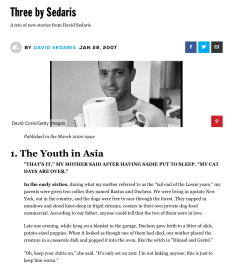 You May Want to Marry My Husband by Amy Krouse Rosenthal was one of the most widely read — and heartbreaking — essays ever to appear in the New York Times “Modern Love” column, which published it ten days before Rosenthal died of cancer this past March. The actress Debra Winger later recorded a podcast of the author describing her husband’s devotion and her desire for him to find new happiness after her impending death.
You May Want to Marry My Husband by Amy Krouse Rosenthal was one of the most widely read — and heartbreaking — essays ever to appear in the New York Times “Modern Love” column, which published it ten days before Rosenthal died of cancer this past March. The actress Debra Winger later recorded a podcast of the author describing her husband’s devotion and her desire for him to find new happiness after her impending death.
 On Tuesday afternoon, her words broke hearts again, this time among members of my weekly English conversation class. We read sections of the article aloud, listened to part of the podcast and then listened to another “Modern Love” podcast about how a woman dealt with her husband’s mid-life crisis.
On Tuesday afternoon, her words broke hearts again, this time among members of my weekly English conversation class. We read sections of the article aloud, listened to part of the podcast and then listened to another “Modern Love” podcast about how a woman dealt with her husband’s mid-life crisis.
This was a change of pace from some of the other articles I’ve assigned recently in my weekly class at the Ialoveni library for advanced English speakers who want to improve their reading and conversaton skills. Our previous selection was The School, a chilling 2007 article in which C.J. Chivers described a Chechan terrorist attack on a school in the Russian town of Beslan, which resulted in the deaths of at least 385 people.
Before that we read three essays by humorist David Sedaris, a Walter Isaacson article describing the science behind Mona Lisa’s smile and Atul Gawande’s article about how he and other physicians need to do more to help dying patients and their families. We’ve also discussed travel destinations, teenage anxiety and the linguistic implications of emojis.
 I originally planned the class as a more conventional book club, where we might read Harry Potter novels or other full-length works likely to appeal to Moldovan readers. When I spoke with a Moldovan friend who runs an English-language center, however, he warned me students wouldn’t have enough time to read the books, which would also be expensive for them to buy.
I originally planned the class as a more conventional book club, where we might read Harry Potter novels or other full-length works likely to appeal to Moldovan readers. When I spoke with a Moldovan friend who runs an English-language center, however, he warned me students wouldn’t have enough time to read the books, which would also be expensive for them to buy. 
He suggested I choose long articles instead, which the students could download or read online.
It was great advice. My students, who range from a Moldovan online journalist to an art student, are generally able to handle even the longer articles, and they come ready to share reactions and opinions that often fascinate me.  Our discussion about the Gawande article, for instance, led to a great conversation about how our two cultures handle death, not only in medical settings but more generally.
Our discussion about the Gawande article, for instance, led to a great conversation about how our two cultures handle death, not only in medical settings but more generally.
For our class next Tuesday I’ve assigned an extraordinary Cincinnati Enquirer series on Seven Days of Heroin. If you’re in Ialoveni and would like to join the discussion, please come to the class. If you’re back in the States and want to participate, (16:30 locally; 9:30 a.m. Eastern time on Feb. 6), please let me know and I’ll try to include you online.







I printed Seven Days of Heroin months ago as potential English Club material but I haven’t yet figured out how to make it work with my students. It’s too long to read during club time and they aren’t good at homework, not that I could print enough copies anyway. I’m from NE Ohio, one of the hardest hit areas during this epidemic. There’s a local (to me) article I printed at the same time that’s much shorter and also packs a punch if you need additional material. It’s called From pills to heroin, then dead, by Ed Runyan for The Vindicator.
LikeLiked by 1 person
I could probably tune in, if you’re interested.
LikeLiked by 1 person
Hi Alison, and thanks for both this and your previous comment. Much appreciated. I’ve already shared with my book club your excellent suggestion about the Ed Runyan article. The reader comments on that one are so powerful. As for your “joining” us at our meeting next Tuesday: Thank you! Let’s go offline to discuss how we might make that work. My email is djarmul@gmail.com. Can you write me there, please? (Likewise to anyone else who might want to participate.)
LikeLike
Alison, if you want to participate tomorrow (Tuesday), I need to hear back from you today on my e-mail, please. Thanks again! — David
LikeLike